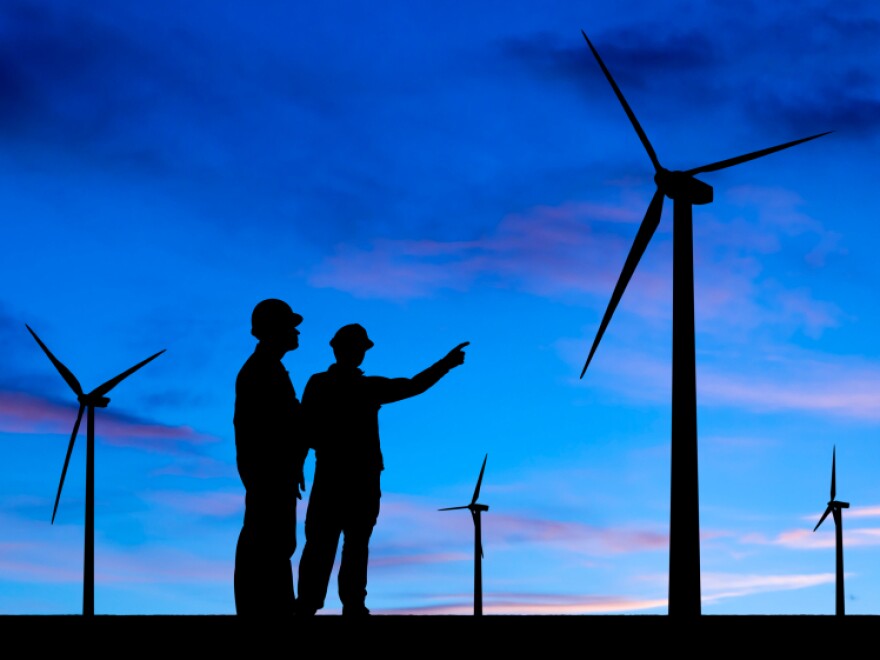In the recession-era days of 2008 and 2009, Jonathan Alexander, now a site manager at the Twin Groves wind farm in Ellsworth, remembers jobs being hard to come by.
Back then, Alexander was based in Mississippi, and his oldest child was born in 2008, meaning the idea "to not work, to not bring in income, was just not an option."
Not a lot of places were hiring, he recalled, but the wind energy sector was — and Alexander got his start with a traveling wind company, meaning he got a job, an income, and chance to see "parts of the country that you probably aren't going to on vacation."
"Initially it was new, it was exciting. It got me out of Mississippi — that was the draw initially," he said. "I did not know that I was about that until I dove in headfirst and found out, 'Hey, this is something I can do.'"
Alexander said he spent a few years as a traveling wind tech with various companies; it was in those travels that he had come across the Bloomington-Normal area and found it appealing.
"I said, 'This is close enough to a few cities I like to visit anyway.' So then I jumped on with Vestas at the time, and then when EDP decided to go self-performing, I decided I liked this platform, I liked this city, this is where I'll be," he said in an interview.
He joined EDP Renewables about five years ago and has been with the company ever since, climbing from various levels of technician to lead tech to the position he now holds, site manager at Twin Groves. Alexander talked with WGLT about EDP Renewables' addition of a new training site in Bloomington, diversification efforts within renewable energy, being on the frontlines of misinformation and more.
The following transcript has been edited for clarity.
WGLT: Your company is set to open a new training site in Bloomington. That's an indication of growth and expansion, right?
Alexander: Yes, absolutely. We've grown to the point where it's heavy on the site to train as many new people that are coming through. The company went ahead and invested in a training facility here in Bloomington (1616 General Electric Road) that, when new techs get hired, their first two weeks of being with EDP will be at this training center. It's very exciting. If I can, I want to sneak into one of the classrooms to actually be a part of it.
Is that because it would be different than how you first joined?
Alexander: Oh, absolutely. For me, first joining was you getting your experience in the field — the end. You got the crash course. So now with it being more formal, it's a nice breath of fresh air for the sites that don't have to dedicate those resources but also know that the techs have that base when they come in.

When you got into this industry, and I guess generally now, what do you need to get in? Do you need any college, training, anything like that?
Alexander: College is helpful. That's very helpful, but not necessary. And there's several ways you can do the college (part) too. There's several community colleges across the country that offer courses — I know Heartland here offers the course as well. There's six-week courses or two-year courses. It just depends on how far you want to go with it, what you can afford. There's several people like myself that started with just a basic mechanical or electrical background. There's farm kids, a lot of farm kids out in these more rural areas that how grown up working on tractors and have that hydraulic ... mechanical background. We look for those types of things.
But just recently hired three individuals with zero turbine experience — that's one of my favorite things about this company and this industry: You don't have to be an expert right out of the gate. Sure, anybody loves experience, but it's not required.
WGLT: What do you want people in the community to know about this work?
Alexander: That, one, you don't have to be "The Great Wind Tech" to join. You don't have to be a man to join. Three, you don't have to be a a Caucasian man to join. There's great growth opportunities within wind.
WGLT: The American Clean Power Association launched an Energy Transition for All initiative aimed at expanding "opportunity for workers, especially those from... historically disadvantaged communities" and leading "in diversity and inclusion." (EDPR NA is a member of ACP.) This might seem like an obvious question, but tell me why that matters and what it leads to.
Alexander: With diversity itself, it brings in different ideas. It gives you a chance to bring in those individuals with a different viewpoint. One of my favorite sayings is, 'In order to change your point of view, you have to change your viewpoint.' It's the way I look at things now. Since I've been in my role, we've hired multiple different ethnicities — and we hired our first two female coworkers.
The field operation side of EDP is heavily dominated by men, but what we've seen in the last four years as we're growing is more and more women getting interested. As the word spreads, as we're going into these community colleges, they're able to say, 'Oh, hey — that's a viable option for me too.' And I love it.

WGLT: Our conversation has been very industry-focused, but I feel like when you talk about renewable energy outside of, like, the workforce aspect, it gets a political element added to it. Does that ever get old?
Alexander: For me? No. Here's why: I enjoy informing people. Most — not all, but most — of the information that you'll hear in some of these rural towns is bad information. So for me to be able to inform people and enlighten them to the truth, it's fun. I get excited over it. It's like a teacher getting excited to teach your child something new. It's fun for me.
WGLT: What do you feel like the most common thread of misinformation is?
Alexander: The biggest one is 'Those things kill birds.' And then you hit them with the statistics and then they see, 'Oh. Wait. Buildings kill more birds. Cats kill more birds.' The amount of birds that are injured by wind turbines is nominal compared to buildings. It's literally hundreds of thousands in difference — and that's counting every turbine across the USA.
WGLT: I'm just wondering — does the height thing keep some people from considering this work?
Alexander: Absolutely. We've had individual candidates come in and they say, 'Oh yeah I've worked on rooftops, no big deal.' Or, 'We're tree trimmers, no big deal. We got this.' And then they get halfway up, take a look down and say, 'That's not for me.'
WGLT: How did you know it was for you?
Alexander: I actually didn't know. I was one of those individuals (such) that the highest I'd been was on top of a house or climbing trees. During my training, initially, I climbed a cell tower and that was only 150 feet at the time. But it was in the middle of a park, so it was beautiful — breathtaking. The view captured me. I said, 'I want this. I want to see more of this.' And I was hooked.


